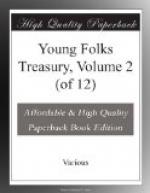For ages the various characters told about in the following pages have charmed, delighted, and inspired the people of the world. Like fairy tales, these stories of gods, demigods, and wonderful men were the natural offspring of imaginative races, and from generation to generation they were repeated by father and mother to son and daughter. And if a brave man had done a big deed he was immediately celebrated in song and story, and quite as a matter of course, the deed grew with repetition of these. Minstrels, gleemen, poets, and skalds (a Scandinavian term for poets) took up these rich themes and elaborated them. Thus, if a hero had killed a serpent, in time it became a fiery dragon, and if he won a great battle, the enthusiastic reciters of it had him do prodigious feats—feats beyond belief. But do not fancy from this that the heroes were every-day persons. Indeed, they were quite extraordinary and deserved highest praise of their fellow-men.
So, in ancient and medieval Europe the wandering poet or minstrel went from place to place repeating his wondrous narratives, adding new verses to his tales, changing his episodes to suit locality or occasion, and always skilfully shaping his fascinating romances. In court and cottage he was listened to with breathless attention. He might be compared to a living novel circulating about the country, for in those days books were few or entirely unknown. Oriental countries, too, had their professional story-spinners, while our American Indians heard of the daring exploits of their heroes from the lips of old men steeped in tradition. My youngest reader can then appreciate how myths and legends were multiplied and their incidents magnified. We all know how almost unconsciously we color and change the stories we repeat, and naturally so did our gentle and gallant singers through the long-gone centuries of chivalry and simple faith.
Every reader can feel the deep significance underlying the myths we present—the poetry and imperishable beauty of the Greek, the strange and powerful conceptions of the Scandinavian mind, the oddity and fantasy of the Japanese, Slavs, and East Indians, and finally the queer imaginings of our own American Indians. Who, for instance, could ever forget poor Proserpina and the six pomegranate seeds, the death of beautiful Baldur, the luminous Princess Labam, the stupid jellyfish and shrewd monkey, and the funny way in which Hiawatha remade the earth after it had been destroyed by flood?
Then take our legendary heroes: was ever a better or braver company brought together—Perseus, Hercules, Siegfried, Roland, Galahad, Robin Hood, and a dozen others? But stop, I am using too many question-marks. There is no need to query heroes known and admired the world over.
As true latter-day story-tellers, both Hawthorne and Kingsley retold many of these myths and legends, and from their classic pages we have adapted a number of our tales, and made them somewhat simpler and shorter in form. By way of apology for this liberty (if some should so consider it), we humbly offer a paragraph from a preface to the “Wonder Book” written by its author:




